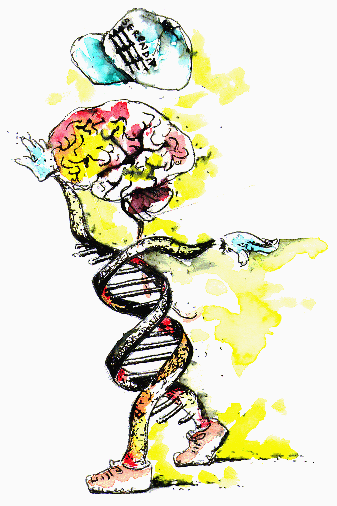Serendip is an independent site partnering with faculty at multiple colleges and universities around the world. Happy exploring!
Neurobiology and Behavior, Spring, 2008

|
Welcome to the home page
of Biology 202 at Bryn Mawr College. Pleased to have you here. I'm
looking forward to an interesting,enjoyable, productive semester of "getting it less wrong", and hope you are too. Let's have some fun, and see what we can all make out of it together.
Students (and visitors) should be aware that this is a "non-traditional" science course in several respects (see below, and Science as Story Telling in Action for further background) |
 |
 
Literary and historical starting points
The Brain - is wider than the Sky -
The Brain is deeper than the sea -
The Brain is just the weight of God - Emily Dickinson (1830-1886)
|
The course is organized in relation to the following general presumptions (see syllabus for specifics):
|
Course Lecture/Discussion Notes
2007 web papers 2008 web papers Some Literary and Historical Starting Points Course Evolving Web Resource List Neurobiology and Behavior Resources on Serendip Mental Health Resources, from Serendip and the Center for Science in Society |
Browse around. Get a sense of what's here, and how it does (or doesn't)
relate to things you might be interested in. Look for things that
surprise you, cause you to think differently (rather than things that
are what you expect, support the ways you already think). Think about
what you think you know about brain and behavior, and why, and what
puzzles you, and why (what IS "thinking"? and what's it good for?). And
expect to be wrong, over and over again. That's the best starting place
... for any kind of scientific inquiry. And the best way starting place
for the productive sharing of ideas with others as well.
Some recent and ongoing conversations you might find interesting and, perhaps, want to participate in ...
The Novelist and the Neurobiologist
The Art Historian and the Neurobiologist
The Psychoanalyst and the Neurobiologist
The Empirical Non-Foundationalist and the Phenomenologue
Exploring Mental Health
A Working Group on Elementary Science Education
29 January
Interesting piece in Sunday's NYTimes Book Review on a new book by Anne Harrington called The Cure Within: A History of Mind-Body Medicine. Directly relevant to some of the issues raised in our course forum this past week. Perhaps a book for commentary, or take off for web papers? Also relevant for some broader issues, as per Evolution/Science: Inverting the Relationship Between Randomness and Meaning. Continuing discussion welcome there, and/or in course forums. Also recommended: The Diving Bell and the Butterfly (re consciousness and differing realities).
Glad to see forums bubbling, not only with thoughts but with conversations. Check back occasionally to see what thoughts you've triggered in others. Along which lines, the brain = behavior issue ...
5 February
Interesting piece in Sunday's NYTimes Book Review on a new book by Anthony Appiah called Experiments in Ethics. Might be good take off point for web paper (first paper due in 3 weeks; see Web Paper Assignment) and/or good book for commentary
Enjoying rich forum conversation. Along which lines, the semi-autonomous input/output boxes within input/output boxes model ...
12 FebruaryMore on pain in last Sunday's NYTimes magazine: The First Ache. Also an interesting piece in Saturday's NYTimes business section: My Cortex Made Me Buy It
First web paper due 26 February (2 weeks from today). See Web Paper Assignment
Forum bubbling, from there on to ....
19 February
Sunday NYTimes Magazine: Taking Play Seriously. See also Serendip's Playground.
First web papers due in class (hard copy) and on line next Tuesday. See Web Paper Assignment for info on electronic submission.
Last week's forum, batteries, and beyond ...
27 February
The battery analogy and My last word on batteries
Back to receptor potentials and on to synaptic potentials/synaptic integration
18 March
First web papers enjoyed, commented on on-line, further comments by email this week
Second web papers due 8 April
On from building blocks to architecture
25 March
Comments on first web papers emailed; contact me if you haven't gotten one yet (except Alspector, Ambash, Asabere)
Second web papers due 8 April
Back to output architecture
1 April
Second web papers due 8 April
The Murky Politics of Mind Body, NYTimes Week in Review, 30 March 2008 (see also The mind-body problem: in theory, in life, in politics)
Back to output architecture (in new place)
8 April
No class a week from today
Back to from the motor to the sensory side
22 April
See posted second web paper comments, further comments by email this week
Third web paper and book commentary due Friday, May 10 (seniors), Friday, May 16 (others)
Back to reality
And on ...






Comments
Post new comment